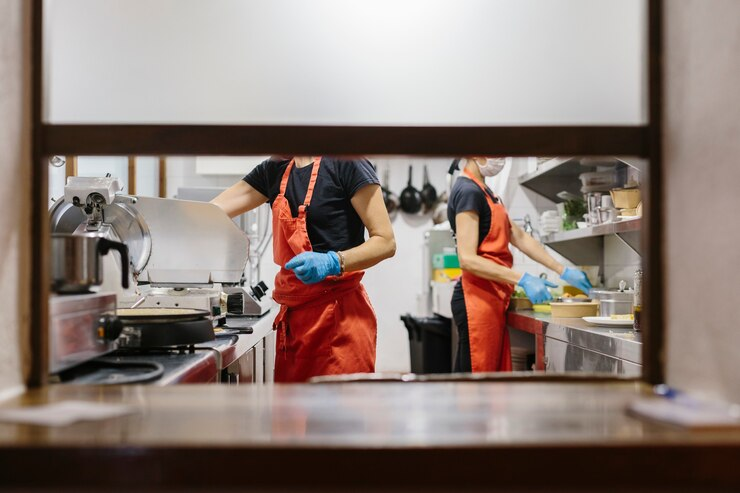
In the food industry, cleanliness is not just about appearances—it’s a critical aspect of food safety. Regular commercial kitchen deep cleaning ensures a hygienic environment, reducing the risk of contamination and keeping operations in compliance with health regulations. Let’s explore the reasons why this process is vital for maintaining food safety and how it benefits commercial kitchens.
The Role of Cleanliness in Food Safety
A clean kitchen sets the foundation for safe food preparation. Bacteria, grease, and grime can accumulate in hard-to-reach places, creating hazards that could compromise food safety.
- Prevention of Cross-Contamination: Deep cleaning removes harmful bacteria from surfaces, tools, and equipment, reducing the chances of cross-contamination.
- Pest Control: A thoroughly cleaned kitchen minimizes the conditions that attract pests, keeping food safe from infestations.
- Compliance with Health Codes: Health inspectors demand high standards. Regular commercial kitchen deep cleaning helps businesses meet these requirements and avoid penalties.
Hidden Areas That Require Attention
Daily cleaning routines may cover visible surfaces, but hidden spots are often neglected. Over time, these areas become breeding grounds for bacteria and other contaminants.
- Exhaust Hoods and Ducts: Grease build-up in these areas poses fire risks and affects air quality.
- Under Equipment: Debris and spills beneath heavy appliances can harbor bacteria and pests.
- Floor Drains: Unclean drains can lead to unpleasant odors and pest infestations.
Addressing these areas through commercial kitchen deep cleaning ensures a safer kitchen environment.
Benefits of Regular Commercial Kitchen Deep Cleaning
The advantages of thorough cleaning extend beyond food safety. Here’s why it’s worth the effort:
- Extended Equipment Lifespan: Deep cleaning prevents grease and grime from damaging kitchen equipment, saving money on repairs and replacements.
- Improved Air Quality: Removing grease from exhaust systems enhances ventilation and creates a better working environment.
- Enhanced Reputation: A clean kitchen reflects positively on the business, building trust with customers and stakeholders.
Scheduling Commercial Kitchen Deep Cleaning
How often should deep cleaning take place? The frequency depends on the type of kitchen, the volume of use, and specific health regulations.
- High-Volume Kitchens: Weekly or bi-weekly deep cleaning is recommended.
- Moderate Use Kitchens: Monthly cleaning might suffice, but regular inspections are crucial.
- Seasonal Operations: Perform a deep clean before and after periods of heavy use.
Working with professional cleaning services ensures the job is done thoroughly and in compliance with industry standards.
Steps Involved in Commercial Kitchen Deep Cleaning
A proper deep cleaning process follows systematic steps to cover every corner of the kitchen. Here are the key stages:
- Initial Assessment: Identifying areas that need attention.
- Equipment Cleaning: Disassembling and cleaning equipment like ovens, fryers, and grills.
- Surface Sanitation: Cleaning countertops, walls, and ceilings.
- Floor and Drain Cleaning: Scrubbing and disinfecting floors and drains.
- Exhaust System Cleaning: Removing grease and grime from hoods and ducts.
These steps ensure a comprehensive approach to maintaining a hygienic kitchen.
Consequences of Neglecting Commercial Kitchen Deep Cleaning
Failing to prioritize deep cleaning can lead to significant risks for any food business:
- Health Violations: Unclean kitchens often result in failed inspections and fines.
- Foodborne Illnesses: Bacterial contamination can cause outbreaks, damaging the business’s reputation.
- Operational Disruptions: Neglected maintenance can lead to equipment breakdowns and costly repairs.
By investing in regular commercial kitchen deep cleaning, businesses can avoid these problems and operate smoothly.
Tips for Maintaining a Clean Kitchen Between Deep Cleans
While deep cleaning is essential, maintaining cleanliness daily is equally important. Here are some tips:
- Implement Cleaning Schedules: Assign tasks to staff to ensure regular upkeep.
- Use Proper Cleaning Supplies: Choose food-safe cleaning agents for everyday tasks.
- Train Staff on Hygiene Practices: Ensure everyone understands the importance of cleanliness.
These practices support a cleaner environment and make deep cleaning more manageable.
Conclusion: Food Safety Starts with a Clean Kitchen
Maintaining food safety requires more than surface-level cleaning. Regular commercial kitchen deep cleaning addresses hidden risks ensures compliance with health regulations, and protects customers from potential hazards. For commercial kitchens, cleanliness is not an option—it’s a necessity. By prioritizing deep cleaning, food businesses can uphold safety standards and build a reputation for excellence.
Ensure the safety of your customers and the success of your business with Sonia’s Clean Sweep’s expert commercial kitchen deep cleaning services. Contact us today to schedule your cleaning and keep your kitchen inspection-ready!
FAQs
Why is deep cleaning important for food safety in commercial kitchens?
Deep cleaning removes grease, dirt, and bacteria, ensuring a safe and sanitary environment for food preparation, which helps prevent contamination.
How often should a commercial kitchen be deep cleaned?
We recommend scheduling a deep clean every 3-6 months, but high-traffic kitchens may require more frequent cleanings.
What does a commercial kitchen deep cleaning include?
Our service covers thorough cleaning of all kitchen surfaces, equipment, vents, floors, and more, ensuring every corner is spotless and safe for food handling.
Can Sonia’s Clean Sweep help with health inspection preparation?
Absolutely! Our deep cleaning services ensure your kitchen meets health inspection standards and passes with ease.
How long does a commercial kitchen deep cleaning take?
The time required depends on the size of your kitchen, but typically, we can complete a deep clean within a few hours to minimize disruption to your business.





Leave a Reply